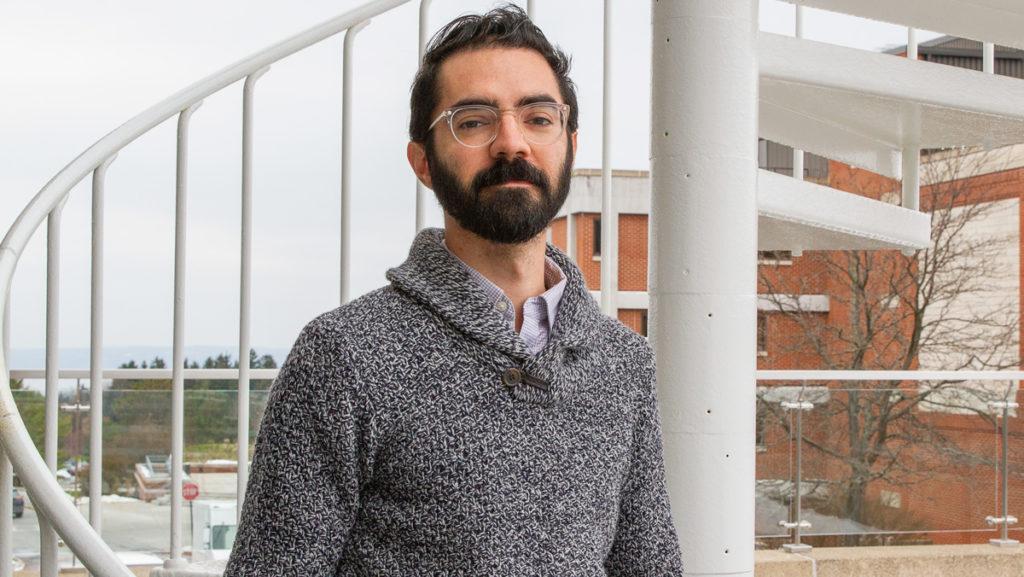Stephan Lefebvre, Diversity Scholars Fellow in the Department of Economics and a predoctoral student at American University, is completing research on wealth, racial inequality and Latino studies.
The School of Humanities and Sciences opens the Diversity Fellowship Program to diverse predoctoral and postdoctoral scholars who are preparing for future tenured positions at colleges and universities. The college accepted five fellows for the 2019–20 academic year. Fellows teach one course each semester and are mentored by senior faculty advisers while continuing research for dissertations and gaining teaching experience. Lefebvre currently teaches Race and Economic Power in the economics department and will teach Math and Economics in Spring 2020.
Lefebvre will receive his Ph.D. in August 2020 in stratification economics, applied microeconomics and economics of education.
Staff writer Nijha Young spoke with Lefebvre about his experience teaching, his continued research and the importance of diversifying the study of economics.
This interview has been edited for length and clarity.
Nijha Young: What’s your favorite part about teaching your topics?
Stephan Lefebvre: I picked this course on race and economics and mathematical econ. They may not seem totally related, and they’re not really related, but they’re two sides that I think are really powerful. So with the Race and Economic Power course that I’m teaching this semester, we are looking at different economic models for racial inequality, different explanations of racial inequality, looking at racial inequality through and race through an economic lens but also through the lenses of sociology and other fields that helps us understand what’s unique about economics, what’s missing there, things like that.
NY: So on your dissertation. It focuses on wealth and racial inequality. Could you explain the specific significance of these topics within the larger umbrella of economics?
SL: I’m really interested in the functional role of wealth. What wealth does. What doors wealth opens. How wealth begets wealth. The way that I got there is being interested in racial inequality. I think that there’s lots of dimensions of economic inequality, but if you think about race and what really undergirds that, it’s wealth. Wealth is passed down through generations, and it explains a lot of the other racial gaps that you see. … So one of the papers that I’m developing looks at the role of extended family wealth on college enrollment. So does the wealth of your aunts, uncles, grandparents matter for whether you go to college or not, or other college outcomes? … You’re missing a lot if you don’t look at wealth. … Parental wealth is, of course, unequally distributed, but extended family wealth is also a dimension of racial inequality. … Whites have greater access to extended family wealth. … This is important because a lot of our public policies like the Free Application for Federal Student Aid (FAFSA) or student aid are based on parental income and sometimes parental wealth, but very rarely do they touch on the extended family.
NY: So in addition to discussing economics, your dissertation touches on principles of Latinx studies. Could you speak more on Latinx studies and how its influenced your writing or informed your dissertation?
SL: So one of the papers that I’m working on, toward Latinx stratification economics, critiques economics and critiques three main theories in economics, usually applied to Latinxs — migration, assimilation and discrimination — from the lens of Latinx Studies, which is an interdisciplinary field in stratification economics. Stratification economics is a sort of new, heterodox, meaning not mainstream, branch of economics that seeks to understand intergroup inequality through group-based competition. So rather than just looking at individuals and assuming away a lot of their individual characteristics, we think that there are these groups out there, for example, racial groups, that are competing as groups, for relative position in a social hierarchy. So whites take actions to maintain or improve their group’s relative status because they benefit from that. So racism is not like an irrational sort of bias some people are born with. … Groups that are in power have an incentive to maintain that power. … Economics and Latinx studies really contrast. Latinx Studies is explicitly nonelitist. It thrives in public institutions with large numbers of Hispanics and interacts with minorities. Economics is very elitist.
NY: Why do you feel opportunities such as the Diversity Fellowship Program are important?
SL: Academic economics can be a really elitist and not welcoming space, so opportunities like this are really important to creating opportunities, allowing people to get their foot in the door. I don’t come from a family of academics. … Something like this helps me gain some of the cultural knowledge that one needs to succeed in this discipline. … I think that there’s a lot of cultural knowledge that if you come from a family of academics, or if you are more privileged in certain ways, things come natural to you.
NY: What do you hope people take away from your dissertation and your teachings?
SL: I think that the central theme is that structural racism is real. The policy choices that governments make, the decisions and the ways that we structure markets and our economy, have the potential to deepen structural racism or promote racial justice. … Sometimes there’s a fear, there’s a reluctance to think about structural racism, thinking about what we need to change in order to move us towards racial justice.








